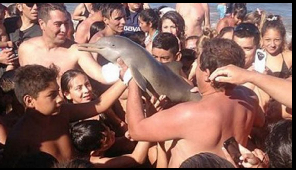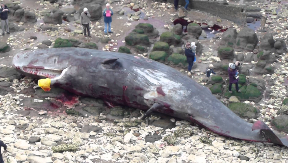 No doubt everyone has heard about the dolphin that was passed between tourists for endless selfies, sparking debates over animal cruelty and inhuman acts. Of course the idea of a dolphin being dragged from the ocean and killed is diabolical, but probably what is most upsetting is that it is believable. It has been claimed that the dolphin was dead when it was found and did not die due to dehydration during the selfie frenzy that ensued, but this may be a lie formed by the offenders who felt guilty after the event – we’ll never know for sure. Whichever story you decide to believe the sad fact still remains that humanity has become more obsessed with trying to snap the ‘perfect picture’ to get a few facebook ‘likes’, rather than trying to help an animal in distress.
No doubt everyone has heard about the dolphin that was passed between tourists for endless selfies, sparking debates over animal cruelty and inhuman acts. Of course the idea of a dolphin being dragged from the ocean and killed is diabolical, but probably what is most upsetting is that it is believable. It has been claimed that the dolphin was dead when it was found and did not die due to dehydration during the selfie frenzy that ensued, but this may be a lie formed by the offenders who felt guilty after the event – we’ll never know for sure. Whichever story you decide to believe the sad fact still remains that humanity has become more obsessed with trying to snap the ‘perfect picture’ to get a few facebook ‘likes’, rather than trying to help an animal in distress.
Shortly after the baby dolphin story emerged, a video went viral of a man holding down a shark on a beach – again for photos. This time the video does confirm that the shark had been caught by a fisherman and was also filmed being released into the water. As far as I’m aware sharks can’t suffer psychological damage and if no physical harm was done it is no different from fishermen who visit fishing ponds. Assuming the animal isn’t away from the water from too long, a quick photo won’t kill it. However, it is setting a dangerous precedent for people to start deliberately seeking out marine animals to take selfies.
Sadly we have around 500 recorded marine animal strandings per year on Britain’s coasts. There are many reasons why these animal become stranded, it may be due to injuries, disease, or entanglement in fishing gear. Many strandings occur when young animals become separated from their mother and can’t survive. Whatever the reason these animals still deserve to be treated with respect.
 But, how many of us would really know what to do if we found a dolphin washed up on the beach? Well there are plenty of ways to find out. The WDC (Whales and Dolphins Conservation) have step by step instructions of what to do and who to call in such a situation. Or, if you are feeling more adventurous and want to be able to physically help a stranded animal, you can look out for training courses in your local area. The BDMLR (British Divers Marine Life Rescue) provide a single day course on how to rescue a beached animal, currently a training course is also being organised in the North West area, (follow the link below for more information).
But, how many of us would really know what to do if we found a dolphin washed up on the beach? Well there are plenty of ways to find out. The WDC (Whales and Dolphins Conservation) have step by step instructions of what to do and who to call in such a situation. Or, if you are feeling more adventurous and want to be able to physically help a stranded animal, you can look out for training courses in your local area. The BDMLR (British Divers Marine Life Rescue) provide a single day course on how to rescue a beached animal, currently a training course is also being organised in the North West area, (follow the link below for more information).
It’s important that people start to appreciate the world without the need of a lens between them – isn’t a story about rescuing a stranded animal better than a picture with a dying one? So, let’s try and see more stories of people saving stranded animals rather than prolonging their suffering for a photo that will probably get lost in the many thousands we take over our lifetime.
Post By:Jennifer Rasal
For information about the training course- https://www.facebook.com/groups/LUMOES/
WDC’s guide of what to do in a stranding situation- http://uk.whales.org/issues/what-to-do-if-you-find-live-stranded-whale-or-dolphin